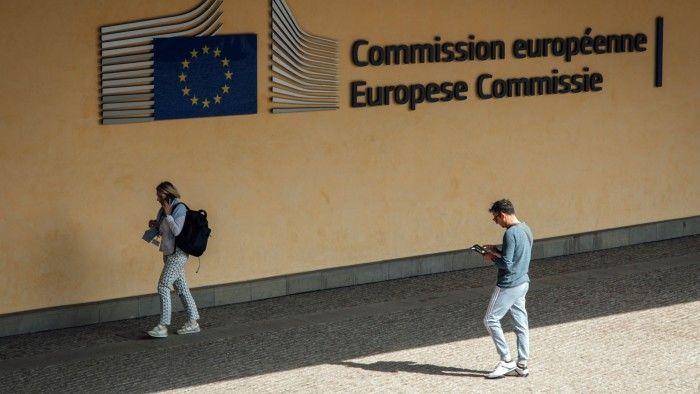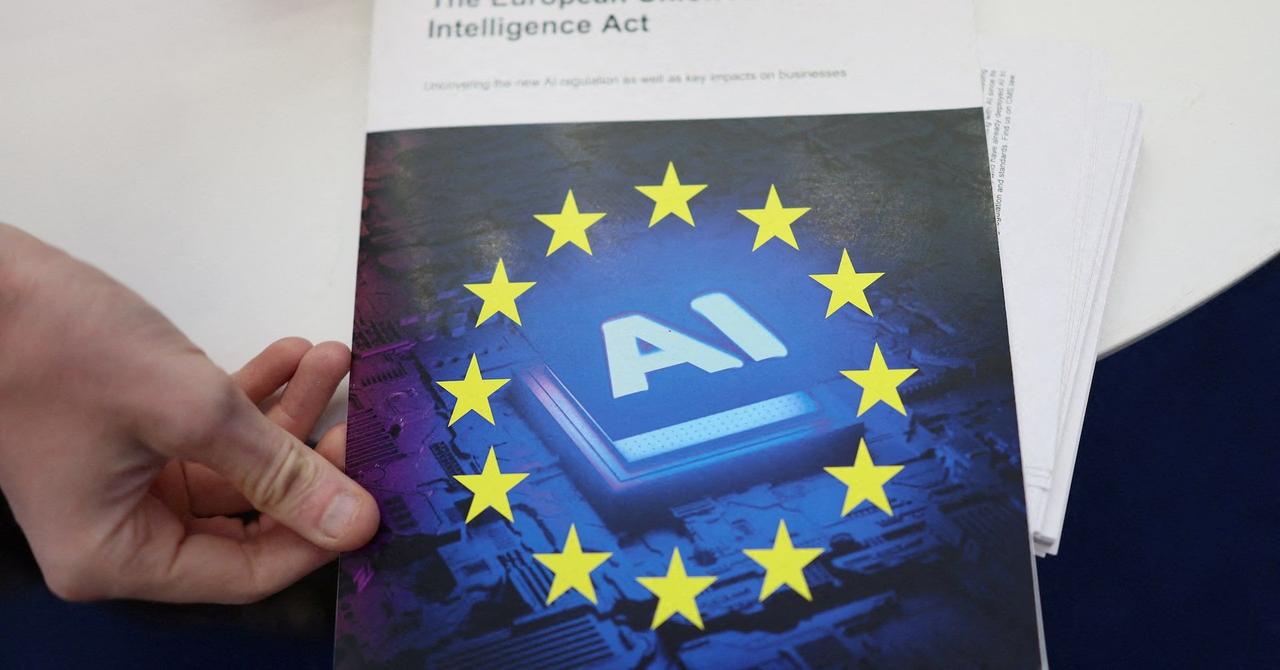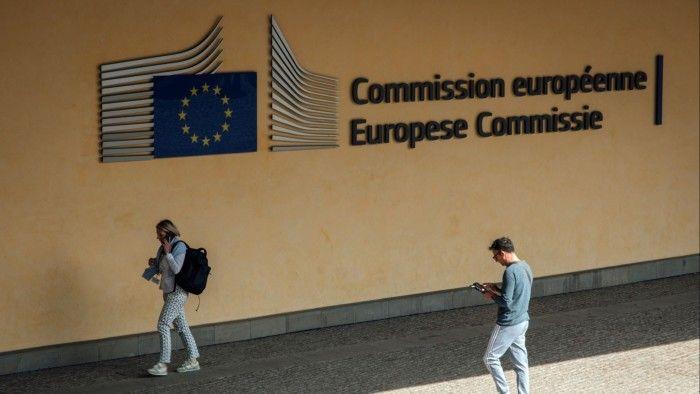European CEOs and Tech Lobby Groups Urge EU to Pause Implementation of AI Act
3 Sources
3 Sources
[1]
European CEOs urge Brussels to halt landmark AI Act
The chief executives of large European companies including Airbus and BNP Paribas have urged Brussels to halt its landmark artificial intelligence act, as the EU considers watering down key elements of the law due to come into force in August. In an open letter, seen by the Financial Times, the heads of 44 major firms on the continent called on European Commission President Ursula von der Leyen to introduce a two-year pause, warning that unclear and overlapping regulations are threatening the bloc's competitiveness in the global AI race. The letter said that the EU's complex rules puts "Europe's AI ambitions at risk, as it jeopardises not only the development of European champions, but also the ability of all industries to deploy AI at the scale required by global competition." Co-signatories also included the chiefs of French retailer Carrefour and Dutch healthcare group Philips. The EU has faced intense pressure from the US government and Big Tech as well as European groups over its AI Act, considered the world's strictest regime regulating the development of the fast-developing technology. The latest lobbying effort comes as Brussels held a crunch meeting with big US tech groups on Wednesday to discuss a new softened draft of its regulations. The current debate surrounds the drafting of a "code of practice", which will provide guidance to AI companies on how to implement the act that applies to powerful AI models such as Google's Gemini, Meta's Llama and OpenAI's GPT-4. Brussels has already delayed publishing the code, which was due in May, and is now expected to water down the rules. The EU's tech chief Henna Virkkunen on Monday said Brussels is finalising the code of practice ahead of the August deadline. "We will publish the code of practice before that to support our industry and SMEs to comply with our AI Act". Officials within the European Commission and in different European countries have been privately discussing streamlining the complicated timeline of the AI Act. While the legislation entered into force in August last year, many of its provisions only come into effect in the upcoming years. "This is a classic example of regulitis that doesn't take into account the most important thing for industry, which is legal certainty", said Patrick Van Eecke, co-chair of law firm Cooley's global cyber, data and privacy practice. The letter from CEOs, which was organised by the EU AI Champions Initiative -- a body representing 110 companies on the continent across industries -- said a postponement would send "innovators and investors around the world a strong signal that Europe is serious about its simplification and competitiveness agenda." European tech entrepreneurs -- and the venture capitalists who back them -- have also criticised the AI Act. A separate joint letter signed by more than 30 European AI start-up founders and investors this week called the legislation "a rushed ticking time bomb". Start-up founders are particularly worried about a lack of clarity about how general-purpose AI models will be regulated, fearing a patchwork of different rules in different member states that will be easier for deep-pocketed US Big Tech companies to navigate than smaller local businesses. A wide range of European businesses have expressed fears that the AI Act will make companies who use or incorporate large language models into their own IT systems responsible for the same regulatory requirements as Big Tech companies in contentious areas such as copyright liability. Some companies also fear that uncertainty about how the rules will be implemented by the member states may deter companies from deploying AI systems, potentially putting them at a disadvantage to rivals in the US or China. The European Commission said it is "fully committed to the main goals of the AI Act, which include establishing harmonised risk-based rules across the EU and ensuring the safety of AI systems on the European market" But it added the bloc is working on an upcoming simplification of its digital rules, so "all options remain open for consideration at this stage."
[2]
Tech lobby group urges EU leaders to pause AI Act
STOCKHOLM, June 26 (Reuters) - Tech lobbying group CCIA Europe, whose members include Alphabet (GOOGL.O), opens new tab, Meta (META.O), opens new tab and Apple (AAPL.O), opens new tab, on Thursday urged European Union to pause implementation of the AI Act, saying a rushed roll-out risks jeopardizing the continent's AI aspirations. Europe's landmark AI rules entered into force in June last year with various provisions to be implemented in a phased manner. Important provisions of the EU AI Act, including rules for general purpose AI (GPAI) models, were due to apply on August 2. But some parts of the GPAI, which were expected to be published on May 2, got delayed, opens new tab. "With critical parts of the AI Act still missing just weeks before rules kick in, we need a pause to get the Act right, or risk stalling innovation altogether," said Daniel Friedlaender, CCIA Europe's senior vice president. Political leaders such as Swedish Prime Minister Ulf Kristersson have also called, opens new tab AI rules "confusing" and asked the EU to pause the Act, ahead of a meeting with other EU leaders in Brussels on Thursday. More than two-thirds of European businesses said they struggle to understand their responsibilities under the EU AI Act, according to a survey, opens new tab by Amazon (AMZN.O), opens new tab Web Services. The EU AI Act is more comprehensive than the United States' light-touch voluntary compliance approach while China's approach aims to maintain social stability and state control. "We are currently implementing the AI Act," EU tech chief Henna Virkkunen told EU lawmakers earlier this month when asked if she would consider a temporary halt to enforcing the AI Act. "I want to implement it in a very innovation friendly manner ... the main concern among some stakeholders is that this is hindering innovations." Reporting by Supantha Mukherjee in Stockholm and Foo Yun Chee in Brussels; editing by Philippa Fletcher Our Standards: The Thomson Reuters Trust Principles., opens new tab Suggested Topics:Artificial Intelligence
[3]
Tech lobby group urges EU leaders to pause AI Act
Tech lobbying group CCIA Europe, whose members include Alphabet, Meta and Apple, on Thursday urged European Union to pause implementation of the AI Act, saying a rushed roll-out risks jeopardizing the continent's AI aspirations. Europe's landmark AI rules entered into force in June last year with various provisions to be implemented in a phased manner. Important provisions of the EU AI Act, including rules for general purpose AI (GPAI) models, were due to apply on August 2. But some parts of the GPAI, which were expected to be published on May 2, got delayed. "With critical parts of the AI Act still missing just weeks before rules kick in, we need a pause to get the Act right, or risk stalling innovation altogether," said Daniel Friedlaender, CCIA Europe's senior vice president. Political leaders such as Swedish Prime Minister Ulf Kristersson have also called AI rules "confusing" and asked the EU to pause the Act, ahead of a meeting with other EU leaders in Brussels on Thursday. More than two-thirds of European businesses said they struggle to understand their responsibilities under the EU AI Act, according to a survey by Amazon Web Services. The EU AI Act is more comprehensive than the United States' light-touch voluntary compliance approach while China's approach aims to maintain social stability and state control. "We are currently implementing the AI Act," EU tech chief Henna Virkkunen told EU lawmakers earlier this month when asked if she would consider a temporary halt to enforcing the AI Act. "I want to implement it in a very innovation friendly manner ... the main concern among some stakeholders is that this is hindering innovations."
Share
Share
Copy Link
European business leaders and tech lobby groups are calling for a pause in the implementation of the EU's AI Act, citing concerns about competitiveness and innovation in the rapidly evolving AI landscape.
European Business Leaders Call for AI Act Pause
In a significant development, chief executives of 44 major European companies, including industry giants Airbus and BNP Paribas, have penned an open letter to European Commission President Ursula von der Leyen, urging a two-year pause on the implementation of the EU's landmark Artificial Intelligence (AI) Act
1
. The letter, organized by the EU AI Champions Initiative, expresses concerns that the current complex regulations could jeopardize Europe's competitiveness in the global AI race.
Source: FT
Tech Lobby Groups Echo Concerns
Adding to the chorus of voices calling for a pause, tech lobbying group CCIA Europe, representing major players like Alphabet, Meta, and Apple, has also urged the EU to reconsider the timeline for implementing the AI Act
2
. Daniel Friedlaender, CCIA Europe's senior vice president, emphasized the need to "get the Act right" to avoid stalling innovation.Challenges in Implementation
The EU AI Act, which entered into force in June 2022, is set to implement various provisions in a phased manner. However, critical parts of the Act, including rules for general purpose AI (GPAI) models, have faced delays. This has led to uncertainty and confusion among businesses, with a survey by Amazon Web Services revealing that more than two-thirds of European businesses struggle to understand their responsibilities under the Act
3
.Balancing Regulation and Innovation

Source: Reuters
The EU's approach to AI regulation is more comprehensive compared to the United States' light-touch voluntary compliance approach. However, this has raised concerns about potential hindrances to innovation. EU tech chief Henna Virkkunen has acknowledged these concerns, stating the intention to implement the Act in an "innovation-friendly manner"
2
.Related Stories
Global Context and Competitiveness
The push for a pause in the AI Act's implementation comes amid intense pressure from various stakeholders, including the US government and Big Tech companies. European businesses fear that the uncertainty surrounding the Act's implementation could put them at a disadvantage compared to rivals in the US or China
1
. This has sparked a debate about Europe's position in the global AI landscape and its ability to foster innovation while maintaining regulatory standards.Next Steps and Potential Outcomes
As the EU considers these calls for a pause, the European Commission has stated that it remains committed to the main goals of the AI Act, which include establishing harmonized risk-based rules across the EU and ensuring the safety of AI systems in the European market. However, the Commission has also indicated that all options remain open for consideration at this stage
1
. The outcome of this debate could significantly impact the future of AI development and regulation in Europe and potentially influence global approaches to AI governance.References
Summarized by
Navi
Related Stories
Recent Highlights
1
Google Gemini 3.1 Pro doubles reasoning score, beats rivals in key AI benchmarks
Technology

2
Pentagon Summons Anthropic CEO as $200M Contract Faces Supply Chain Risk Over AI Restrictions
Policy and Regulation

3
Canada Summons OpenAI Executives After ChatGPT User Became Mass Shooting Suspect
Policy and Regulation








